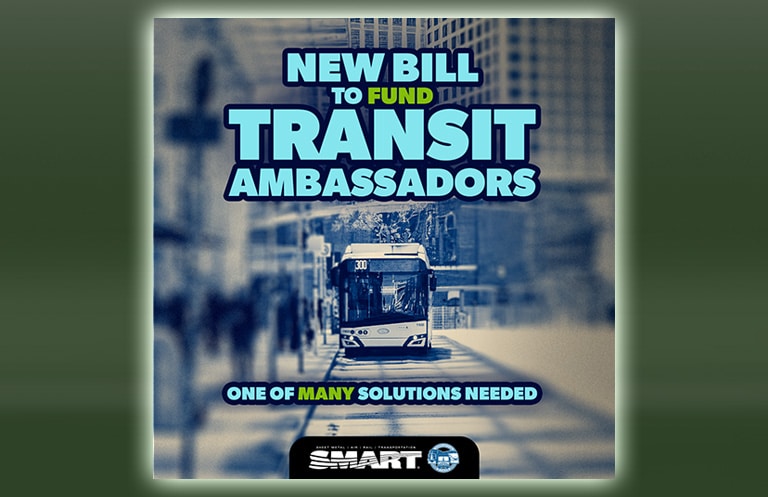
Across the country, transit workers continue to face the growing threat of being attacked on the job every day.
This serious issue is finally being addressed on a national level.
Coming to a Bus Near You: Transit Ambassadors
Sponsored by Representative Lateefah Simon (CA-12) and endorsed by SMART-TD, the “Transit Ambassador and Public Safety Enhancement Act” would allow transit agencies to use federal funds to establish transit ambassador programs designed to de-escalate disputes before they become violent and ultimately improve public safety.
Transit ambassadors are defined as “unarmed [uniformed] personnel responsible for performing a variety of duties designed to provide an added sense of security to transit patrons through the presence of such personnel on transit vehicles…deterring disruptive behavior within transit systems.”
Some of those duties include monitoring transit stations and vehicles, observing and reporting suspicious activity and security threats to law enforcement, and handling minor, non-criminal conflicts.
By engaging directly with transit workers and riders, transit ambassadors are also tasked with simultaneously restoring a culture of safety and respect that’s becoming less common on public transportation.
Transit Ambassadors Proven Successful in San Francisco Pilot
Back in 2020, Representative Simon led this same effort for San Francisco’s Bay Area Rapid Transit. After a successful pilot, the agency established the country’s first-ever transit ambassador program.
With fare disputes causing the bulk of assaults against transit workers, operators are often forced to choose between enforcing payment policies and protecting their own safety.
Transit ambassadors are not a substitute for local law enforcement and would only have reporting authority, but they’re an important, proactive tool in the fight to curb attacks against transit workers and de-escalate situations before they turn violent.
“Catch and Release” of Hostile Passengers a Failed Strategy
While this legislation is a good first step toward addressing violence on public transportation, SMART-TD Bus and Transit Assault Prevention and Safety (BTAPS) Committee Member Brian Eden (Local 1470, Maryland) believes that the root of the problem needs to be tackled.
A conductor for Amtrak, Brother Eden points out that many of these situations, such as fare evasion or operator assault, are only classified misdemeanors.
“I have many officers tell me that the offending person will be back at the station and on the next train before the police officer even finishes the paperwork,” he explained. “This leads to a ‘catch and release’ mindset among officers who don’t want to be bogged down in paperwork for issues that will never even see a courtroom.”
Combine Solutions: Include Real Consequences and Operator Training
To help solve that problem, Brother Eden suggests increasing the penalties for these infractions to at least minor felonies, creating “no-ride” lists where people are banned where they commit specific offenses, de-escalation training for all employees, and a heightened police presence on trains.
“[This legislation is] a great first step,” he said. “I’m just asking that we don’t let it end here.”
Together with our transit brothers and sisters across the country, SMART-TD will continue fighting until all operators are guaranteed the safest work environment possible!
Related News
- The Makings of a Railroad Merger
- East Palestine Documentary Emphasizes Fight for Rail Safety
- Statement from SMART-TD on the Proposed Union Pacific and Norfolk Southern Merger
- 1% Declares War On 2-PC & SMART-TD
- Report Blocked Crossings with New FRA Digital Tool
- LAST CALL: Submit Your Photos for 2026 Calendar Today!
- Heroic Act on the Rails: SMART-TD Brother Burned while Saving Crewmate
- Unions Join Together to Fix Overtime Tax Loophole for Transportation Workers
- Department of Transportation cancels more than $300 million in funding for Mass. megaproject
- Trailblazing production apprenticeship strengthens Local 16 in Oregon